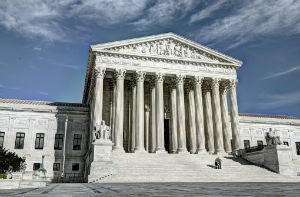The Supreme Court of New Jersey recently held that the public has the right to access recordings from the mobile video recorders (MVRs) in police vehicles under the common law right of access. The court further held in North Jersey Media Group, Inc. v. Township of Lyndhurst that unredacted Use of Force Reports must be disclosed pursuant to the Open Public Records Act (OPRA).
Facts of the Case
On September 16, 2014, a North Arlington resident called 9-1-1 to report an attempted car break in. The police tried to stop the suspect’s car; however, he refused to stop. During the subsequent high-speed police chase, Kashad Ashford attempted to ram a patrol car head-on. The pursuit ultimately ended when Ashford lost control of his vehicle and crashed it into a guardrail. According to the Attorney General’s press release, Ashford tried to escape by accelerating, which caused the car to “jerk[] in a rear and forward motion.” An unidentified officer said that he thought the SUV might strike and possibly kill him and another officer. Several officers fired shots at Ashford, and he later died.
Within days of the fatal police-involved shooting, reporters from The Record and South Bergenite filed requests for records under OPRA and the common law right of access. After the records’ custodians failed to provide the requested documents, plaintiff North Jersey Media Group, Inc. (NJMG) filed suit, alleging violations of OPRA and the common law right of access.
The trial court held that the defendants improperly withheld the requested records, concluding that neither OPRA’s criminal investigatory records exception nor its ongoing investigation exception applied. The Appellate Division reversed. It concluded that, aside from the 9-1-1 recording, motor vehicle accident reports, and portions of Computer Aided Dispatch reports and other logs that do not relate to the criminal investigations, the requested documents fell within the criminal investigatory records exception.
The Appellate Division remanded to the trial court to reconsider NJMG’s request under OPRA’s ongoing investigation exception and the common law. On remand, the trial court ruled that defendants were not required to release the names of the officers or disclose two remaining Use of Force Reports (UFRs), three dash-cam videos, and three police reports. The court cited the need to maintain the integrity of the ongoing investigation.
Court’s Decision
The Supreme Court of New Jersey unanimously held that OPRA mandated the disclosure of unredacted Use of Force Reports, while the dash-cam recordings of the incident must be made available under the common law. However, the court concluded that investigative reports, witness statements, and similarly detailed records were not subject to disclosure at the outset of the investigation, which was when they were requested.
The court first addressed the requests for the Use of Force Reports. It noted that to qualify for OPRA’s criminal investigatory records exception a record (1) must not be “required by law to be made,” and (2) must “pertain[] to a criminal investigation.” Applying this test, the court then concluded that because Use of Force Reports are “required by law to be made,” they do not qualify for OPRA’s criminal investigatory records exemption. In reaching its decision, the New Jersey Supreme Court agreed with the lower court that the Attorney General’s Use of Force Policy, which requires Use of Force Reports to be filed after a deadly police shooting, has “the force of law for police entities.”
The Court further held that the ongoing investigation exception did not apply to the Use of Force Reports. “The release of UFRs presents far less of a risk of taint to an ongoing investigation because UFRs contain relatively limited information,” Chief Justice Stuart Rabner wrote on behalf of the court. “Also, defendants in this case raised only general safety concerns.”
The court next determined that the police dash cam videos fall within OPRA’s criminal investigatory records exception. In reaching this conclusion, the panel highlighted that the Attorney General has not issued a directive relating to the use of dash-cams. It also rejected NJMG’s argument that general retention schedules to implement the Destruction of Public Records Law satisfy the “required by law” standard.
Nonetheless, the New Jersey Supreme Court ultimately concluded that the public’s substantial interest in disclosure of dash cam recordings warranted the release of those materials under the common law right of access. “Under the common law the public’s powerful interest in disclosure of that information, in the case of a police shooting, eclipses the need for confidentiality once the available, principal witnesses to the shooting have been interviewed,” Chief Justice Rabner explained.
“Footage of an incident captured by a police dashboard camera … can inform the public’s strong interest in a police shooting that killed a civilian,” he added. “It can do so in a typical case without placing potential witnesses and informants at risk.”
For more information about the court’s decision in North Jersey Media Group, Inc. v. Township of Lyndhurst or the legal issues involved, we encourage you to contact a member of Scarinci Hollenbeck’s Government Law Group.
The Supreme Court of New Jersey recently agreed to consider whether the New Jersey Constitution bans a county government from giving historic preservation grants to local churches. The case is Freedom from Religion Foundation v. Morris County Board of Chosen Freeholders. 
The suit, which was brought by the Freedom From Religion Foundation (FFRF), alleges that the Morris County Freeholders violated Article 1, Paragraph 3 of the New Jersey State Constitution by providing Morris County Preservation Trust Fund grants to local churches. Article 1 provides that no person shall be obliged “to pay tithes, taxes or other rates for building or repairing any church or churches, place or places of worship, or for the maintenance of any minister or ministry, contrary to what he believes to be right or has deliberately and voluntarily engaged to perform.”
“The New Jersey Constitution must trump any other considerations,” the lawsuit argues. The Complaint asked the Court to declare that each of defendants’ “grants of taxpayer funds to churches,” made during the two years prior to December 1, 2015, violated the New Jersey Constitution. The Complaint further requested the Court to enjoin defendants from “offering taxpayer money to any church” in the future.
In January, Superior Court Judge Margaret Goodzeit dismissed the lawsuit. “Just because the religious groups have put Morris County on notice that they intend to use their churches for worship does not mean that Morris County is somehow inextricably entangled with religion,” the judge concluded.
In her decision, Judge Goodzeit highlighted that Morris County relies on neutral criteria when determining whether applicants are eligible for historic preservation grants. “Morris County desires to sustain historic landmarks, not just historic churches,” she wrote.
While Judge Goodzeit acknowledged the importance of FFRF’s work, she rejected its interpretation of the state Constitution. “The Court recognizes the FFRF’s mission and its endeavor to promote a healthy separation of church and state. Without organizations like the FFRF, one check that keeps the balance even disappears. However, in the case at bar, precedent clearly indicates that to adhere strictly to the literal interpretation of Article I, Paragraph 3 of the New Jersey Constitution, as advocated by FFRF, would be a mistake,” she wrote.
The FFRF appealed the decision to the Appellate Division. The New Jersey Supreme Court recently granted the Morris County Freeholders’ request to proceed directly before the state’s highest Court. We will be closely watching this case and encourage readers to check back regularly for updates.
For more information about the court’s decision in Freedom from Religion Foundation v. Morris County Board of Chosen Freeholders or the legal issues involved, we encourage you to contact a member of Scarinci Hollenbeck’s Government Law Group.
In Doe v. Hopewell Valley Reg. School Distr. Bd. of Ed., the Appellate Division held that Hopewell Valley Regional School District was not liable for damages arising out of sexual abuse committed against a student by one of the District’s former teachers. According to the court, there was no evidence the District knew, or had any reason to know, about the teacher’s conduct during Doe’s enrollment as a District student.

Facts of the Case
The plaintiff, John Doe, alleged that from approximately 1982 to 1986 he was sexually assaulted on multiple occasions by a teacher at one of the Hopewell Valley Regional School District’s schools. He asserted claims for intentional sexual assault against the teacher, and negligence and negligent retention against the school district. The suit specifically alleged the school district was a “passive abuser” under the Child Sexual Abuse Act (CSAA).
According to Doe’s complaint, the abuse started when the teacher was Doe’s 6th grade math teacher and continued until he was in 11th grade. During this time, the teacher hired Doe to do yard work, invited Doe to stay overnight at his grandmother’s house, took an “inappropriate” photo of Doe, and asked Doe to call him by his first name.
At trial, the plaintiff’s expert, an expert in educational administration and educator sexual abuse, testified the District’s policies in the 1980s did not address the “prevention of child sexual abuse,” or include “mandated reporter policies.” He also testified that the District did not train its staff on child sexual abuse reporting policies even though other districts in the 1980s conducted such training. In contrast, the District’s expert testified that there were no policies regarding sexual abuse training in schools until the 1990s, and that it was not the professional standard of care that a school district have a policy on the prevention of child sexual abuse.
The jury returned a verdict finding the teacher sexually abused Doe from approximately 1983 until 1988, and awarded $200,000 in compensatory damages and $100,000 in punitive damages. The jury found the District was not negligent in its supervision and retention of the teacher, and did not violate the CSAA as a passive abuser. Doe moved for a new trial, arguing the jury’s decision in favor of the District constituted a “clear injustice.” The trial court denied the motion, and Doe appealed.
Court’s Decision
On appeal, the court affirmed the trial court’s order denying the plaintiff’s motion for a new trial. It held that the record showed there was no evidence that the District knew, or had any reason to know, about the teacher’s conduct during Doe’s enrollment as a student.
In reaching its decision, the court emphasized that it was the jury’s job to weigh the testimony of the competing experts and determine whether the District took “reasonable measures” and acted in a manner consistent with the standards extant during the 1980s.
The court also concluded that the District could not be held liable under the CSAA, which imposes liability on both “active” and “passive” sexual abusers. Under the CSAA, a passive sexual abuser may be found liable if the plaintiff can demonstrate the defendant is: “(1) a [p]erson; (2) standing in loco parentis (3) within the household.” Key to the court’s holding was the fact that the District could not be considered a “household.” The court noted that the New Jersey Supreme Court previously held that a private boarding school was a “household” under the CSAA. Hardwicke v. Am. Boychoir School, 188 N.J. 69, 86 (2006). But the court distinguished Hardwicke on the grounds that it involved a full-time boarding school, one where the institution provided the daily necessities and amenities normally associated with a household. The District’s school provided only daytime schooling.
For more information about the court’s decision in Doe v. Hopewell Valley Reg. School Distr. Bd. of Ed. or the legal issues involved, we encourage you to contact a member of Scarinci Hollenbeck’s Government Law Group.
In a recent decision, the Appellate Division of the New Jersey Superior Court clarified that familial and social affiliations do not qualify as the constitutionally protected conduct required to make a claim under the New Jersey Civil Rights Act (NJCRA). In Lapolla v. County of Union, the plaintiff alleged that he suffered adverse employment actions because his politically active brother sparred with the chairwoman of the Union County Democratic Party.

Facts of the Case
Plaintiff Richmond Lapolla, a long-time employee of Union County, filed suit against the county, alleging violations of the NJCRA, intentional infliction of emotional distress, and retaliation. Lapolla started working for the county in 1979 as a maintenance repair carpenter. During his career, the plaintiff was promoted several times.
Lapolla was a member of the Union County Democratic Committee (UCDC) for approximately 10 years. However, he did not play a very active role. According to the plaintiff, the UCDC consisted of two factions, one of which was led by Charlotte DeFilippo, the chairwoman of the UCDC. The other faction included Lapolla’s brother, Michael Lapolla, and “anybody who didn’t walk in lockstep with Charlotte DeFilippo.”
Michael became County Manager in 1997 over the objections of DeFilippo, who had wanted defendant George Devanney to become County Manager. In 1999, while his brother was County Manager, plaintiff became the head of the Division of Buildings and Grounds in the Department of Operational Services. He received the Civil Service title of Director, Repair and Maintenance.
During Michael’s tenure, he and DeFilippo often disagreed over the day-to-day operations of the county. In 2002, Michael resigned as County Manager, and Devanney assumed the position. Plaintiff subsequently became director of the newly formed Department of Operations and Facilities. He was later subjected to a series of transfers, which the plaintiff characterized as demotions. The plaintiff still holds his Civil Service title, and he never suffered a reduction in pay.
Violations of the NJCRA
The NJCRA provides, in pertinent part:
Any person who has been deprived of any substantive due process or equal protection rights, privileges or immunities secured by the Constitution or laws of the United States, or any substantive rights, privileges or immunities secured by the Constitution or laws of this State, or whose exercise or enjoyment of those substantive rights, privileges or immunities has been interfered with or attempted to be interfered with, by threats, intimidation or coercion by a person acting under color of law, may bring a civil action for damages and for injunctive or other appropriate relief.
Under Galli v. N.J. Meadowlands Comm’n., 490 F.3d 265, 271 (3d Cir. 2007), a plaintiff who alleges retaliation for political affiliation must show: (1) he was “employed at a public agency in a position that does not require political affiliation”; (2) he was “engaged in constitutionally protected conduct”; and (3) the conduct was “a substantial or motivating factor in the government’s employment decision.”
In Elrod v. Burns, 427 U.S. 347 (1976), the U.S. Supreme Court held that “termination of public employees’ employment because of their political affiliation violates the First Amendment unless the position at issue involves policymaking.” The Court later expanded the doctrine to hold “the First Amendment [also] protects public employees . . . from promotion, transfer, recalls, and other hiring decisions conditioned on political affiliation, unless the government can demonstrate that party affiliation is a proper requirement for the position.”
Court’s Decision
The Appellate Division upheld the trial court’s decision to dismiss the lawsuit. It held that Lapolla had not shown that he was engaged in “constitutionally protected conduct,” an essential element of an NJCRA claim.
In reaching its decision, the appeals court noted that the plaintiff failed to identify any “expressive exercises or beliefs” of his that were “sufficiently similar to those of the plaintiffs in the seminal cases” to be protected by the First Amendment. It further highlighted that Lapolla did not support a losing candidate, fail to yield to pressure to support any particular candidate, or exercise his right to refrain from any political activity.
As the panel further explained:
Plaintiff described his political participation as minimal, all in support of the UCDC, and not any particular faction. His contention is that he was discriminated against because his brother was a member of a faction of the Democratic Party that clashed with the other faction led by DeFilippo. But, in his deposition testimony, he maintained he was not a member of the disfavored faction. Thus, he has not presented a case in which his “political affiliation” was separate from the interest identified with DeFilippo based on a divergence from “commonality of political purpose, partisan activity and political support.”
Based on the foregoing, the Appellate Division concluded that the political activity and association Lapolla described did not fit within the traditional political affiliation categories that are “clearly established” as constitutionally protected.
For more information about the court’s decision in Lapolla v. County of Union or the legal issues involved, we encourage you to contact a member of Scarinci Hollenbeck’s Government Law Group.

In Endrew F. v. Douglas County School District, the U.S. Supreme Court unanimously held that public schools are responsible for providing students with disabilities education programs that are “more than de minimis.” The Court’s decision significantly expands the obligations of New Jersey public schools under the Individuals with Disabilities Education Act (IDEA).
Facts of the Case
Under IDEA states receive federal funds to assist in educating children with disabilities. States must satisfy certain statutory requirements, namely providing every eligible child a “free appropriate public education” (FAPE), in order to receive funding. Further, cases interpreting IDEA have mandated that each student must have a uniquely tailored individualized education program (IEP) that sets forth an educational program that is “reasonably calculated to enable the child to receive educational benefits.”
In Endrew F., the parents of Petitioner Endrew, a child with autism, sought reimbursement of his private school tuition. Endrew’s parents removed him from the Douglas County School District after concluding that he was failing to progress. Endrew had been enrolled in the district’s special education program from preschool through fourth grade. When the school district proposed a fifth grade IEP that was nearly identical to those of prior years, Endrew’s parents pulled him from public school. Within six months, he had made significant progress at the specialized private school.
Endrew’s parents subsequently filed a complaint with the Colorado Department of Education, citing IDEA, seeking reimbursement for Endrew’s private school tuition. The Department of Education denied Endrew’s parents’ request for reimbursement. The Federal District Court and the Tenth Circuit Court of Appeals affirmed the Department of Education’s denial. The Tenth Circuit held that a child’s IEP is adequate as long as it is calculated to confer an “educational benefit [that is] merely . . . more than de minimis.” The Tenth Circuit further held that because Endrew’s IEP had been “reasonably calculated to enable [him] to make some progress,” he had received a FAPE.
New Special Education Standard Under the IDEA
The United States Supreme Court unanimously rejected the Tenth Circuit’s approach. It held that “[t]o meet its substantive obligation under the IDEA [Individuals with Disabilities Education Act], a school must offer an IEP reasonably calculated to enable a child to make progress appropriate in light of the child’s circumstances.”
In reaching its decision, the Court strongly rejected the “de minimis standard.” As Chief Justice John Roberts wrote, “A student offered an educational program providing ‘merely more than de minimis’ progress from year to year can hardly be said to have been offered an education at all. For children with disabilities receiving instruction that aims so low would be tantamount to ‘sitting idly…awaiting the time when they were old enough to ‘drop out.'”
The Court explained, “[f]or a child fully integrated in a regular classroom, an IEP typically should be ‘reasonably calculated to enable the child to achieve passing marks and advance from grade to grade.'” Disabled students, for whom advancement from grade to grade is “not a reasonable prospect,” an IEP “must be appropriately ambitious in light of his circumstances.” Notably, the Court’s decision stressed the importance of parents’ input when implementing an IEP. Accordingly, the new standard requires “prospective judgment by school officials” that “will be informed not only by the expertise of school officials but also by the input of the child’s parents and guardians.”
While the Court’s ruling is a welcome relief to parents of students with special needs, it will require many public-school districts to revise their special education programs. To ensure compliance with the new IDEA standard, it is advisable to seek guidance from experienced counsel.
For more information about the Supreme Court’s decision in Endrew F. v. Douglas County School District or the legal issues involved, we encourage you to contact a member of Scarinci Hollenbeck’s Government Law Group.
In Bound Brook Board of Education v. Glenn Ciripompa, the Supreme Court of New Jersey held that an arbitrator exceeded his authority by applying the standard for proving a hostile-work-environment, sexual-harassment claim under the Law Against Discrimination (LAD) to a claim of unbecoming conduct in a tenured teacher misconduct hearing.
Facts of the Case
Defendant Glenn Ciripompa is a tenured high school math teacher in the Bound Brook School District (District). The Bound Brook Board of Education (Board) charged defendant with two counts of unbecoming conduct after an investigation into the transmission of nude photographs uncovered defendant’s pervasive misuse of his District-issued laptop and iPad, as well as evidence of inappropriate behavior toward female colleagues, often in the presence of students. Count I of the complaint centered on Ciripompa’s improper use of the District-issued laptop and iPad, while Count II set forth allegations concerning his inappropriate behavior.
Pursuant to the Tenure Employees Hearing Law (TEHL), the matter was referred to an arbitrator. He determined that the Board failed to prove that the conduct charged in the second count met the four-prong hostile work environment test set forth in Lehmann v. Toys ‘R’ Us, Inc., 132 N.J. 587, 603-04 (1993). In his analysis of Count II, the arbitrator noted that, “[w]hile the charges contained in Count II do not specifically state sexual harassment, it is clear from the nature of the allegations and the cited policy that this is in fact the case, as [defendant] has likewise recognized.”
The arbitrator found that the Board had proven the allegations underlying Count I but dismissed Count II with prejudice, reducing the penalty from dismissal to a 120-day suspension without pay. On appeal, the Superior Court reversed the arbitrator’s decision, holding that the arbitrator “erroneously changed the nature of Count II and imposed an inappropriate standard.” However, the Appellate Division reinstated the award, finding no error.
Court’s Decision
The New Jersey Supreme Court held that “[t]he arbitrator impermissibly converted the second charge [of unbecoming conduct] into one of sexual harassment.” Accordingly, it deemed the arbitrator’s award invalid and remanded the case to be decided by a new arbitrator.
While the court acknowledged that an arbitration award is “not to be cast aside lightly,” it noted that there are several statutory bases upon which a court may vacate an arbitral award. Citing the Third Circuit’s decision in Metromedia Energy, Inc. v. Enserch Energy Servs., 409 F.3d 574, 579 (3d Cir. 2005), the court concluded that “a claim that an arbitrator decided a legal question not placed before him or her by the parties is tantamount to a claim that the arbitrator ‘imperfectly executed [his or her] powers’ as well as a claim that the arbitrator exceeded his or her authority within the meaning of N.J.S.A. 2A:24-8(d).”
In this case, the court found that the arbitrator “imperfectly executed his powers” as well as exceeded his authority by failing to decide whether Count II stated a successful claim of unbecoming conduct in support of termination. As highlighted by the court, “proving hostile work environment is not necessary to satisfy the burden of showing unbecoming conduct.” Rather, a charge of unbecoming conduct requires only evidence of inappropriate conduct by teaching professionals.
Here, the arbitrator impermissibly transmuted the allegation of unbecoming conduct into a charge of hostile work environment sexual harassment. As explained in the opinion:
Here, the arbitrator erroneously faulted the Board for failing to prove a charge that it did not bring. The arbitrator erred in his reliance on Lehmann because he imposed a different
and inappropriate standard of proof on the Board to sustain its unbecoming conduct in the presence of students claim. The arbitrator “imperfectly executed” his power by misinterpreting the intentions of the Board so significantly as to impose a sexual harassment analysis, when such an analysis was wholly ill-suited in this context. The Lehmann standards for hostile-work-environment, sexual-harassment claims arise in an entirely different context — under the New Jersey Law Against Discrimination (LAD), N.J.S.A. 10:5-1 to -42.
As the decision highlights, school boards should use precise language when filing tenure charges. Had the complaint been drafted more specifically, the costly legal dispute likely could have been avoided.
For more information about the decision in Bound Brook Board of Education v. Glenn Ciripompa or the legal issues involved, we encourage you to contact a member of Scarinci Hollenbeck’s Government Law Group.
In Brian Royster v. New Jersey State Police, the Supreme Court of New Jersey ruled that the New Jersey State Police (NJSP) was entitled to sovereign immunity with respect to plaintiff’s claim under the Americans with Disabilities Act (ADA). The plaintiff, a former state trooper, had argued that the NJSP either waived the defense through its litigation conduct or is estopped from asserting the defense of sovereign immunity because it failed to raise it until after the jury returned a verdict.
Facts of the Case
Brain Royster suffers from ulcerative colitis, which requires that he have immediate access to restroom facilities at his place of employment. After returning from a medical leave to treat this condition, he was assigned to conduct surveillance from a vehicle. Even though Royster repeatedly requested to be transferred to a position that allowed access to a restroom, he remained on surveillance duty for approximately seven months.
Royster filed suit, alleging that the NJSP failed to make reasonable accommodations for his disabling medical condition in violation of the New Jersey Law Against Discrimination (LAD) and the federal Americans with Disabilities Act (ADA). After a jury found in Royster’s favor on the ADA failure-to-accommodate claim, and awarded $500,000, the NJSP moved for judgment notwithstanding the verdict. For the first time, the NJSP asserted that, as an arm of the State, it enjoyed sovereign immunity.
In response, Royster argued that it was fundamentally unfair to allow the NJSP to raise the sovereign immunity defense after the jury’s verdict. The trial court held that the NJSP was “estopped from asserting lack of jurisdiction after waiting over 7 years [and] completion of the trial.” On appeal, the Appellate Division reversed. The panel reasoned that, because the State’s sovereignty extended to the NJSP, the defense of sovereign immunity could be raised at any time.
Court’s Decision
A divided New Jersey Supreme Court upheld the Appellate Division’s decision regarding the ADA claim. The NJSP’s “litigation conduct did not amount to a waiver of immunity,” nor is the NJSP “estopped from asserting the defense of sovereign immunity against plaintiff’s ADA claim,” the majority held.
While the Court acknowledged that the United States Supreme Court has recognized that waiver can be premised on litigation conduct, as when a state chooses to voluntarily remove a case to federal court, it noted that the state’s courts have not done the same. “Unlike their federal counterparts, New Jersey courts have never declared that the State may waive its immunity from suit in state court through its litigation conduct,” Justice Solomon wrote.
The Court further concluded that “because our Legislature has provided no clear and unequivocal expression of consent to be sued under the ADA, defendant enjoys sovereign immunity from plaintiff’s ADA claim.” Accordingly, NJSP’s litigation conduct did not amount to a waiver of immunity “because defendant did not invoke the court’s jurisdiction or do anything other than appear and defend against plaintiff’s ADA claim.”
The Court also refused to apply equitable estoppel to the defense of sovereign immunity against plaintiff’s ADA claim, noting that neither the United States Supreme Court nor the New Jersey Supreme Court has ever done so before. “Even if equitable estoppel could be applicable to the defense of sovereign immunity, we would reject its application here” because there was no “misrepresentation of material fact by one party” or “unawareness of the true facts by the party seeking an estoppel,” Justice Solomon added.
Ultimately, the Court stated the Law Against Discrimination (“LAD”) statute contains a clear waiver of sovereign immunity and, thus, the NJSP were precluded from asserting immunity as a defense to Royster’s LAD claim. To “remain consistent with the spirit of LAD,” the court reinstated the LAD failure to accommodate claim, and remanded the case to the trial court with the instructions to mold the jury’s award to reflect an award of $500,000, pursuant to Royster’s LAD claim.
For more information about the Court’s decision in Brian Royster v. New Jersey State Police or the legal issues involved, we encourage you to contact a member of Scarinci Hollenbeck’s Government Law Group.
The New Jersey Supreme Court recently issued its much-anticipated decision regarding whether municipalities must satisfy the affordable housing need which arose from the end of the second-round housing cycle in 1999 to the present, referred to as the “gap period.” In In Re Declaratory Judgment Actions Filed By Various Municipalities, County Of Ocean, Pursuant To The Supreme Court’s Decision In In re Adoption of N.J.A.C. 5:96, 221 N.J. 1 (2015), the state’s highest court redefined “present need” to account for the gap period.
Legal Background
As we have previously discussed on this blog, the Supreme Court of New Jersey transferred the administration of affordable housing rules back to the courts, effectively stripping the Council on Affordable Housing (COAH) of any power after failing to promulgate affordable housing rules.
In the wake of the decision, the trial courts have been asked to determine how municipalities should determine their housing quotas. A series of expert reports by EConsult Solutions, on behalf of the municipalities, projects a significantly lower obligation, while the experts used by the Fair Share Housing Center project a significantly higher obligation. The difference is attributable, in part, to whether the 15-year gap period from the end of the second round housing cycle in 1999 to the present is taken into consideration.
Ocean County Judge Mark Troncone held that municipalities must consider the so-called “gap period.” He reasoned that “New Jersey’s affordable housing need is cumulative and there can be no gaps in time left unaddressed.” The Appellate Division reversed, rejecting the trial court’s position that municipalities must make a “separate and discrete” gap-period calculation. The court maintained that its holding did not ignore the affordable housing need that arose from 1999 to 2015. Rather, to the extent that “[low- and moderate-income] households formed during the gap period” might be living in overcrowded or deficient housing, the need that arose during the gap would be “partially included” in the calculation of present need. The Fair Share Housing Center appealed.
NJ Supreme Court’s Decision
The Supreme Court of New Jersey affirmed the Appellate Division decision, albeit with significant modifications. “Towns are constitutionally obligated to provide a realistic opportunity for their fair share of affordable housing for low- and moderate-income households formed during the gap period and presently existing in New Jersey,” the court held.
The court held that there “could be no hiatus in the constitutional obligation” to address the need of low- and moderate-income households. In support of its decision, the court stated that “[t]he modification of the previous definition of a present-need analysis is essential in order to address the failure of COAH to perform its required mission, in connection with a constitutional obligation, for a period of time affecting almost a generation of New Jersey citizens.” It further noted that “[t]here is no fair reading of the Court’s prior decisions that supports disregarding the constitutional obligation to address pent-up affordable housing need for low- and moderate-income households that formed during the years in which COAH was unable to promulgate valid Third Round rules.”
As for how to account for need arising during the gap period, the New Jersey Supreme Court effectively crafted its own solution. As detailed in the court’s opinion:
The trial courts must employ an expanded definition of present need. The present-need analysis must include, in addition to a calculation of overcrowded and deficient housing units, an analytic component that addresses the affordable housing need of presently existing New Jersey low-and-moderate income households, which formed during the gap period and are entitled to their delayed opportunity to seek affordable housing.
The court further added:
The trial court must take care to ensure that the present need is not calculated in a way that includes persons who are deceased, who are income-ineligible or otherwise are no longer eligible for affordable housing, or whose households may be already captured through the historic practice of surveying for deficient housing units within the municipality.
As New Jersey Supreme Court’s decision makes clear, the process for determining municipal affordable housing obligations is riddled with complex questions. This now provides an opportunity for both municipalities and developers to be flexible in crafting plans that are both economically feasible and demonstrate the use of sound planning principles. Municipalities are encouraged to discuss the potential impact of the court’s decision with experienced counsel.
For more information about the affordable housing case or the legal issues involved, we encourage you to contact a member of Scarinci Hollenbeck’s Government Law Group.
Last month, a federal court ruled that Camden Municipal Court and the City of Camden violated the Americans with Disabilities Act (ADA) by failing to provide a court interpreter for a deaf litigant. The decision in Perez v. Camden Municipal Court highlights that public entities must be mindful of their obligations under the ADA. 
Facts of the Case
The plaintiff, Miguel Perez, had profound deafness and required a sign language interpreter to communicate and understand spoken words. According to the court, Perez was unable to speak intelligibly, read lips, or read written English beyond a second-grade level.
After being convicted of driving under the influence, Perez was ordered to complete an Intoxicated Driver Resource Center (IDRC) program. However, he failed to complete the program. Perez maintained that the IDRC failed to provide him an interpreter, while the Camden Municipal Court and the City of Camden (collectively, the defendants) asserted that Perez decided not to attend despite accommodations that the IDRC offered.
Because Perez failed to complete the program, he was summoned to appear in Camden Municipal Court. During the course of several court proceedings, he was not provided an interpreter. At one hearing, Perez claimed that he was forced to wait for five hours for an interpreter. Camden Municipal Court Judge Steven Burkett then communicated with Perez via writing on a piece of paper to inform him that the hearing was rescheduled.
Perez ultimately completed the IDRC program. He later filed a lawsuit against the defendants, alleging violations of the ADA, Rehabilitation Act of 1973 and New Jersey Law Against Discrimination (NJLAD).
Liability under the ADA
Title II of the ADA prohibits public entities from discriminating against individuals with disabilities in the provision of public services. To prove a prima facie case under Title II, the plaintiff must show: “[1] he is a qualified individual with a disability; [2] that he was excluded from a service, program, or activity of a public entity; and [3] that he was excluded because of his disability.” Disability Rights New Jersey, Inc. v. Comm’r, New Jersey Dep’t of Human Servs., 796 F.3d 293 (3d Cir. 2015).
In demonstrating that they were excluded from a service, program, or activity of a public entity, plaintiffs may allege that the public entity failed to provide “appropriate auxiliary aids and services” where “necessary to afford an individual with a disability an equal opportunity to participate in, and enjoy the benefits of, a service, program, or activity.” Finally, demonstrating that the individual was excluded because of his disability “does not require a failure-to-accommodate plaintiff to show that his injury was the result of purposeful discrimination.” Muhammad v. Court of Common Pleas of Allegheny Cty., Pa., 483 F. App’x 759, 764 (3d Cir. 2012).
Court’s Decision
U.S. District Judge Robert Kugler of the District of New Jersey granted summary judgment in favor of Perez with respect to his ADA, NJLAD and Rehabilitation Act claims.
In reaching his decision on the ADA claim, Judge Kugler highlighted that the defendants failed to provide an interpreter on seven occasions that plaintiff appeared in Court. “Not providing access to the courts is an exclusion for which a plaintiff can recover under the ADA,” he wrote. Judge Kugler also found that Perez had provided “ample evidence that he would have been able to participate in and understand the hearings … had defendants provided an interpreter.”
Judge Kugler rejected the defendants’ argument that Perez was not deprived of meaningful access to the Court. “It is undisputed that plaintiff is profoundly deaf, cannot lip read, and reads written material at a second-grade level; no reasonable trier of fact could conclude that the exchange of written notes would afford plaintiff meaningful access to Court proceedings,” he wrote.
The Court also dismissed the assertion that that the defendants’ responsibilities under the ADA were extinguished because Perez was at fault for not attending IDRC. “The Supreme Court, however, has characterized access to the Courts as a ‘basic right,’ and this Court is aware of no authority restricting the right based on a litigant’s culpability,” Judge Kugler explained.
For more information about the court’s decision in Perez v. Camden Municipal Court or the legal issues involved, we encourage you to contact a member of Scarinci Hollenbeck’s Government Law Group.
The Supreme Court of New Jersey recently agreed to add another key case involving the state’s Open Public Records Act (OPRA) to its docket. Paff v. Ocean County Prosecutor’s Office revolves around the disclosure of police video recordings, which has become a high-profile issue in the wake of several controversial police-involved shootings.

Facts of the Case
Plaintiff John Paff sought police dash cam recordings of an incident involving a Tuckerton Borough police officer’s arrest of a driver for several motor vehicle offenses. The arrest later resulted in charges of police misconduct. The Ocean County Prosecutor’s Office refused to provide the recordings, citing that they were exempt from disclosure under OPRA as “criminal investigatory records.”
In the lawsuit that followed, the trial court ordered the police video recordings to be disclosed pursuant to OPRA. By a vote of 2-1, a divided Appellate Division affirmed. It held that OPRA’s “criminal investigatory records” exemption, as well as the “investigation in progress” exemption, did not apply to the police dash cam recordings. In reaching its decision, the majority noted that “OPRA’s clear purpose . . . is to maximize public knowledge about public affairs in order to ensure an informed citizenry and to minimize the evils inherent in a secluded process.”
OPRA Issues Before NJ Supreme Court
On appeal, the New Jersey Supreme Court has agreed to consider the following question:
Among other issues, does this police vehicle’s video recording of an arrest fall within the “criminal investigatory records” exemption to the Open Public Records Act (OPRA), N.J.S.A. 47:1A-1 to -13; and, if the video recording is subject to disclosure, can the arrestee’s privacy-based objection justify withholding the recording?
Oral arguments have not yet been scheduled. We will continue to closely monitor the case and post updates as they become available.
For more information about the OPRA case or the legal issues involved, we encourage you to contact a member of Scarinci Hollenbeck’s Government Law Group.


